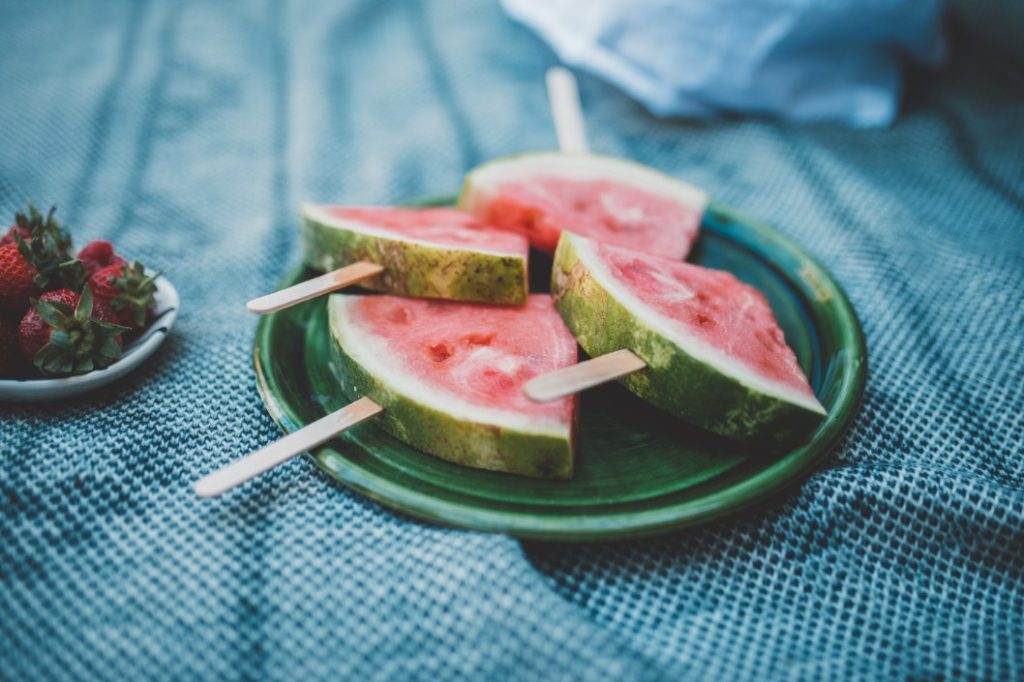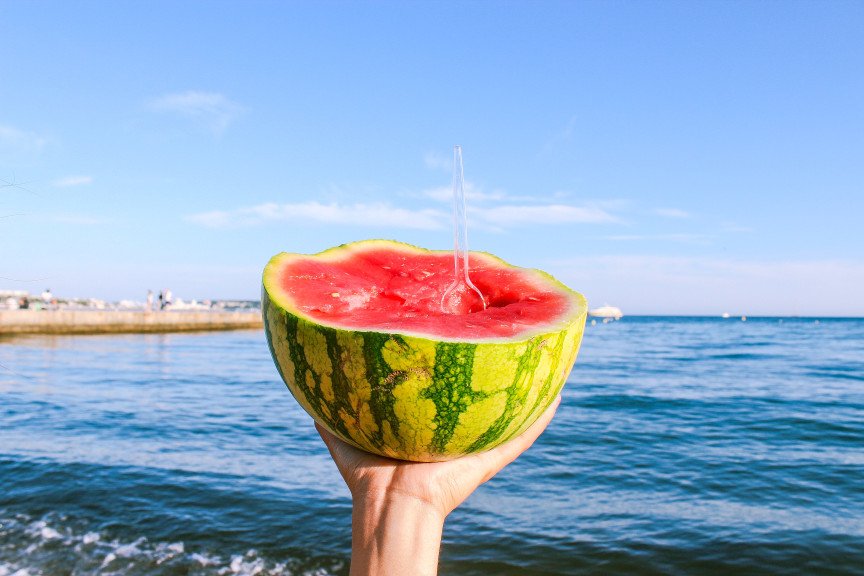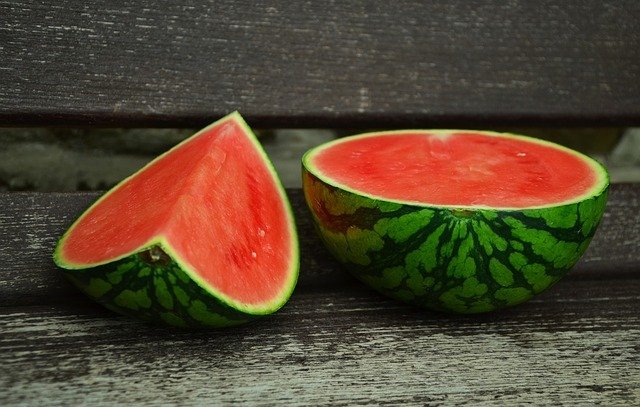Is It O.k. To Give My Dog Watermelon?

Watermelon is a very popular and very delicious summer treat!

It increases hydration, improves heart health, and can even provide relief for our sore muscles.
Watermelon is even thought to help prevent the development of cancer cells.
But, do these benefits only apply to humans or would they also apply to our canine companions?
Can dogs eat watermelon?
Can they eat the watermelon rind?
Is it safe for them to eat the seeds from a watermelon? If they can have watermelon, should they have seedless watermelon only?

Let’s take a deeper look at a watermelon and whether or not it is a safe summer treat for our four-legged friends to enjoy.
Can Dogs Eat Watermelon?
If you are wondering if you can feed your dog watermelon then the short answer is “yes.”
However, you should have all of the facts before you offer up a slice to him.
Watermelon is full of vitamins and minerals but low in calories which makes it a fantastic treat for almost anyone to enjoy.

It is also great for increasing hydration for both you and your pooch.
Watermelon can serve as a particularly beneficial treat during the summer months when running and playing outside causes him to lose more water than he may be taking in.
Watermelon also contains vitamins and minerals that help improve your dog’s immune system.
These vitamins and minerals include:
- Magnesium
- Vitamin A
- Vitamin C
- Beta-carotene
- Potassium.
However, it is important not to overdo it. Our dogs’ digestive systems cannot handle fruits the same way our digestive systems can.

So, can a dog eat watermelon? Yes, watermelon is a “safe” treat for a dog to have, but only in moderation.
Can Dogs Eat The Watermelon Rind?
The next question you may have regarding your pooch and watermelon is whether or not he can eat the watermelon rind.
The short answer here is “don’t bother.” However, the reason for this answer is worth examining.
While the red insides of the watermelon are greatly beneficial to both humans and dogs, the rinds are not.

Before you or your pooch eats watermelon, the rind should be removed (or at least discarded once the red insides have been eaten).
Neither you nor your dog will benefit from consuming the watermelon rind as it does not offer any nutritional perks.
In fact, it is more likely that the rind will become a choking hazard, cause an internal obstruction along the digestive tract, or hurt the teeth and gums while being chewed.
The rind of the watermelon will also not offer any amount of hydration which is one of the main perks of feeding watermelon to your pooch in the first place.
So, can dogs eat the watermelon rind? Whether or not they can eat the rind is not really the question.

Whether or not they should is the question at hand and the answer is “no” as consuming it does not offer any benefits.
Can Dogs Eat Watermelon Seeds?
Now that we have looked into the watermelon itself and the watermelon rind, you may be wondering if the seeds of the watermelon are safe for your pooch to consume.
The short answer here is really based on whether or not a dog should consume the watermelon seeds, and the answer is “no.”
However, it is important to know the reason.
The seeds and pits found in fruits are usually not good to consume by anyone (except maybe Mother Earth).

These pits and seeds often times contain levels of toxins such as cyanide which can cause intense health problems to the consumer.
These health conditions include:
- Kidney failure
- Toxin poisoning
- Choking
- Asphyxiation
- Internal obstruction in the digestive tract
- Appendicitis,
- Possibly become fatal.
Watermelon seeds have not shown to be as problematic when consumed as various other seeds and pits but, they are still recommended to be removed before consumption by you or your pup.
By removing the seeds before eating watermelon, you avoid any potential risk of toxin poisoning or other hazards and you will also greatly reduce the risk of your dog choking while eating watermelon.

So, can dogs eat watermelon seeds? Again, whether or not your dog can eat the watermelon seeds is not truly the question.
Whether or not your dog should eat watermelon seeds is the question and the answer is “no” as it is better to avoid any potential risk of health problems.
Can Dogs Eat Seedless Watermelon?
So, after gathering all of the above information about whether or not the various parts of the watermelon are safe for our dogs to consume, we can now figure out what exactly should be offered to them.
If you intend on sharing pieces of watermelon with your canine companion then it is best to purchase a seedless watermelon.

This way you avoid the hassle of removing the seeds yourself and you reduce the risk of missing a few.
If you purchase a seedless watermelon then the next step to be taken is to cut it up into slices or bite sized pieces.
The bite sized pieces would be better for your pooch especially if he or she is trying it for the first time.
You should also remove the rind at this time to make munching on watermelon easier and less dangerous for both you and your dog.
Once the watermelon is seedless, rindless, and chopped up then all that is left is to enjoy it!

So, can dogs eat seedless watermelon? Yes, in fact, it is recommended!
Your dog is much safer consuming small bits of a seedless and rindless watermelon than he would be if you offered up a piece of watermelon with seeds and rind still attached.
In the end, yes watermelon is a “safe” doggie treat and will offer him various health benefits especially during the summer months.
No, your dog should not consume the rind of the watermelon as it does not offer any health benefits and may become a choking hazard.
No, your pooch should not consume the seeds of the watermelon as they may cause health problems, choking, or toxin poisoning.

Yes, you should consider purchasing a seedless watermelon if you plan to share it with your dog.
Remember, offer small pieces to your pooch at a time. Observe his behavior. Does he eat it and enjoy it or completely avoid it?
You will want to take note of any diarrhea, vomiting, or other changes that occur after the watermelon is consumed.
If he experiences a negative reaction (i.e. diarrhea) then consider cutting back on the quantity next time.
If he experiences diarrhea again then it is likely best to avoid this treat.

Watermelon may be beneficial to his health but this is only true as long as it does not make him ill.

